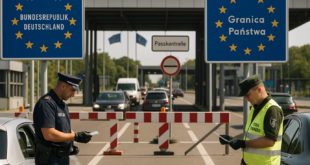Residents of Germany can expect numerous changes again in July 2020. Several of these are related to the ongoing corona crisis, such as the reduction in VAT or the end of tenancy protection or the easing of travel ban on non-essential travel into EU member countries. Pensioners, on the other hand, can look forward to a pension increase. The African Courier summarises the most important changes taking effect from 1 July here.
—-
Lower VAT
From 1 July to the end of the year, the federal government has reduced value added tax (VAT) from 19 to 16 percent, and from 7 to 5 percent for food and everyday goods. The goal of the reduction is to boost the purchasing power of consumers and thereby stimulate the economy again. Goods and services purchased from now until 31 December should therefore be cheaper. So, if you plan to buy big ticket items, such as TV, furniture and computers, they should be cheaper until the end of the year.
Pensioners get more money
The approximately 21 million pensioners in Germany should get noticeably more money in summer. According to a decree by the federal government, the pension increases by 3.45 percent in western Germany and by 4.2 percent in the eastern federal states.
Deutsche Bahn cuts fares
As from 1 July, tickets for long-distance travels by Deutsche Bahn customers will be 1.9 percent cheaper. This applies as well as to train cards and season tickets in long-distance transport.
Protection against dismissal for tenants ends
From the beginning of April to the end of June, tenants who could not pay their rent did not have to fear the termination of their tenancy agreement. The regulation affected both tenants of residential space, as well as commercial tenants. The payment of the arrears must be paid after two years at the latest.
A similar delay of payment was allowed for the supply of electricity, gas, telecommunications (including the Internet) and water. The regulations no longer apply from 1 July as they have ended on 30 June.
Submission deadline for tax returns
There is a clear submission deadline for the 2019 tax return: the completed forms must be submitted to the tax office by 31 July at the latest. If the tax returns are filed by a tax adviser or income tax relief association, the deadline will be extended until 1 March 2021.
Travel ban to the EU relaxed
After the coronavirus crisis brought global tourism to a standstill for more than three months, travel to Germany is possible again. In concrete terms, this means that (almost) all travellers from the European Union, Britain or countries in the Schengen Area no longer need a special reason for travelling to Germany and don’t have to go into quarantine upon arrival. Travellers can move freely throughout Germany.
The EU Commission has also begun to gradually ease the ban on travellers from non-EU countries from 1 July. Countries such as the USA or Russia, where the situation of the pandemic is currently much worse than in the EU, are initially not on the list of countries whose inhabitants can travel to the EU. US President Donald Trump has maintained a ban on EU nationals from entering the country since mid-March.
Below is the list of so-called third countries (non-EU countries), whose residents are allowed to travel freely to and from the EU:
– Algeria
– Australia
– Canada
– Georgia
– Japan
– Montenegro
– Morocco
– New Zealand
– Rwanda
– Serbia
– South Korea
– Thailand
– Tunisia
– Uruguay
– China, subject to confirmation of reciprocity
The countries were chosen based on certain criteria, including that the number of new cases over a 14-day period had to be “close to or below the EU average”. However, it should be noted that it is up to individual EU countries whether they accept the list or not.
Every two weeks the list of countries will be reviewed and the information updated here
Strict entry restrictions still apply to arrivals from other non-EU countries. People from these countries may only enter Germany, other EU countries and Schengen members with a good reason. After entry, they must go into a two-week quarantine.
You can find up-to-date information on entry regulations on the EU website Re-open EU. This website provides information in 24 languages about the coronavirus pandemic rules of the individual EU countries and is continuously updated.
Face Mask requirement
The obligation for mouth and nose covering on public transport and while shopping still applies throughout Germany. An infringement is generally considered an administrative offence and can be fined in some federal states.
Femi Awoniyi/© TheAfrican Courier
READ ALSO New laws and regulations in Germany from June 2020
 THE AFRICAN COURIER. Reporting Africa and its Diaspora! The African Courier is an international magazine published in Germany to report on Africa and the Diaspora African experience. The first issue of the bimonthly magazine appeared on the newsstands on 15 February 1998. The African Courier is a communication forum for European-African political, economic and cultural exchanges, and a voice for Africa in Europe.
THE AFRICAN COURIER. Reporting Africa and its Diaspora! The African Courier is an international magazine published in Germany to report on Africa and the Diaspora African experience. The first issue of the bimonthly magazine appeared on the newsstands on 15 February 1998. The African Courier is a communication forum for European-African political, economic and cultural exchanges, and a voice for Africa in Europe.


































